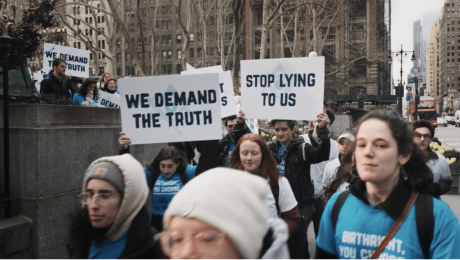Arts
You are here
Israelism – A much-needed look at the collective trauma at the heart of Jewish America

February 28, 2024
When I walked into the sold-out screening of Israelism at the Rio Theatre in so called Vancouver, feelings of shared joy and excitement were met by the same feelings of collective grief that one might encounter at a celebration of life for a beloved member of their community.
This was a group of people with one common goal: to witness.
We were there to watch Israelism and attend a Q & A afterwards in-house with director Sam Eilertsen and the protagonist of the film, Simone Zimmerman. On the panel were two of Vancouver’s most renowned and respected Jewish voices: Canadian author and filmmaker, Dr. Naomi Klein, and physician and trauma expert Dr. Gabor Maté.
The film is directed by two Jewish Americans, Erin Axelman and Sam Eilertsen, whose own stories served as inspiration for their compelling documentary. Since its release in February of last year (preceding the events of October 7), Israelism has had many screenings around North America, but for obvious reasons, the film has found itself in higher demand in recent months and is currently touring across North America and Europe.
Skillfully weaving multiple narratives and perspectives from those on both sides of the dividing wall between Jerusalem and Bethlehem, the film centers American Jewish perspectives into an expansive portrayal of the talking points that often emerge when people speak about Israel and Palestine.
Throughout this work, Axelman and Eilertsen also draw attention to the alarming degree to which pro-Israel policy relies on advocacy from Jewish youth to uphold its governing power within the United States through mass mobilization and funding campaigns.
L.A.-born Jewish American Simone Zimmerman (co-founder of IfNotNow) and a former Israeli soldier and Jewish American known only as “Eitan” remain central characters throughout the film, reflecting on their individual upbringings within their own communities in America and the deep connections to Israel that were cultivated and celebrated within every aspect of their lives from an early age.
“Israel was just treated like a core part of being a Jew, so you did prayers, and you did Israel,” says Zimmerman in the film.
From early memories of Jewish summer camp and her first high school exchange program in Israel, to advocacy with American Israel Public Affairs Committee (AIPAC) events, Zimmerman describes defending Israel as something that was deeply instilled into her identity as a Jewish American.
“AIPAC is just a thing that you do,” said Zimmerman. Adding that going to the AIPAC conference is seen as “just another community event.”
In the wake of rising white nationalism and actual antisemitism, Isrealism vividly portrays the myriad of ways with which pro-Israel legislation and mass mobilization around the world to suppress Palestinian freedom does not defend the Jewish community, and actually comes at the cost of Jewish safety worldwide.
Eitan and Zimmerman reveal details of their time in Jewish summer camps, where running military drills dressed in army uniforms and learning to shoot a gun for the first time were commonly accepted as standard childhood activities.
“It’s just a normal part of how our childhood looked like,” said Zimmerman.
At a time when politics feel deeply polarizing and rife with misinformation, this film offers an informed perspective while simultaneously offering a safe space for the Jewish community to unpack a complex and multilayered grief.
Regardless of your background, Jewish, Israeli, Palestinian, this documentary is a must-see for anyone and everyone who has the desire for liberation and peace in this world.
By bringing Jewish Americans to the center of this conversation, Axelman and Eilertsen highlight the vast capacity that Jewish Americans possess to affect change for Palestinian liberation while compassionately addressing the cycle of collective trauma that has been wielded against the Jewish population worldwide.
In lieu of relying solely on Palestinians to prove their reality to the outside world, this film offers a glimpse into a growing movement of Jewish Americans that are acting as leaders in their own communities, to reinvigorate an authentic Jewish identity that works towards the liberation of everyone.
Rabbi Miriam Grossman provides a beautiful encapsulation of Jewish identity in the film that is independent from the violent restraints of Zionist ideology. She describes Jewish tradition as “a chain of people, of ancestors, of texts, and traditions that are about justice and fighting for it.”
The panel that followed the film underlined the global Jewish community’s need to unpack their collective grief in order to truly address the real risks of antisemitism that exist worldwide today. The misleading philosophy that Israel will keep Jewish people safe only endangers us all by misdirecting our attention away from the true perpetrators of antisemitic violence.
This event further imbued the necessity of allowing space to process our grief without shame, while ensuring accountability is kept on our way towards collective liberation. Freedom can only be achieved when we can mobilize collectively from a place of compassion and truth.
“Jewish tradition tells us to envision a world where all people are safe and free, to never stop fighting for that world,” continues Grossman in the film to a support group of fellow Jewish Americans. “May you all feel blessed in a tradition of liberation, may you be blessed to know you’re not alone. Let’s get to work.”
Learn more about the movie and where to see it here
Section:









